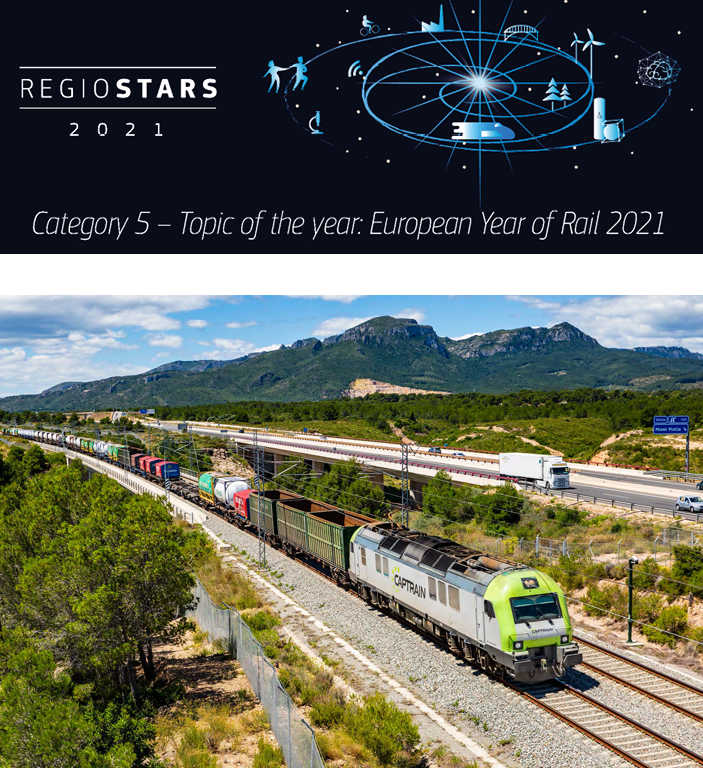The Transnational Intermodal Links towards Sustainability (TRAILS) project is encouraging a modal shift from road freight to rail along the Mediterranean corridor between Catalonia, Spain, and Occitanie, France. By promoting cross-border coordination, the project is making rail freight between the two regions a more efficient and attractive option, while reducing greenhouse gas emissions from trucks.
TRAILS promotes shift to rail freight in the France-Spain cross-border area
- 10 May 2021
‘The amount of CO2 being saved through TRAILS has had an impact far beyond the Catalonia-Occitanie cross-border area, because the railway services the project is supporting extend from the south of Spain to Germany and the UK. While transversal projects require a lot of coordination and management, they have a large impact on crucial parts of the logistics chain and a positive impact on the environment.'
TRAILS created a digital platform that brings together multimodal services of both regions to encourage more businesses to move their cargo by rail.
The platform features an interactive mapping system that displays every rail connection in the cross-border area. Railway terminals, logistic centres, river ports and port terminals are displayed. Users can calculate routes, download, and share maps.
Diversifying logistics
So far, TRAILS has brought together and supported over 650 businesses, from SMEs, start-ups and export companies, to loaders, carriers and operators. Through its online platform, they can communicate and use the digital tools to diversify their logistics to include rail transportation.
Multimodal logistics centres have been set up in Barcelona and Tarragona in Catalonia, and in Perpignan, Le Boulou and Toulouse, in Occitanie. In Catalonia, a committee coordinates all TRAILS-related operations and support services.
With its own funding, the committee is independent of the project and provides a permanent support framework for rail transport beyond the scope of TRAILS. In Occitanie, a logistics cluster maintains and updates the digital tools of the project, including its interactive mapping feature, observatory of rail costs and website.
Less pollution
Around 70 % of transport-related carbon emissions in the EU are generated by road freight. The Jonquera border crossing between Spain and France represents 50 % of all goods transport between the two countries, of which only 2% is by rail.
To mitigate this, the project supported the introduction of four new transnational freight services. Three more are under development. Two existing services have been consolidated into one, optimised connection.
For every new train service, approximately 13 million truck kilometres are saved. That amounts to an annual CO2 reduction of approximately 15 000 tonnes. Less congested roads also mean less noise pollution and reduced risk of accidents.
Increasing demand for cargo
Both the North of Spain and the South of France are important points of origin for agricultural exports and the distribution of fresh produce from North Africa and the Mediterranean corridor. This makes logistics and transport crucial to businesses in these regions. By 2030, it is expected that demand will have increased by 40%, which will bring with it a huge increase in freight operations.
Most of the businesses not yet using rail are SMEs because they are unable to fully load the trains, which increases logistics costs significantly.
By proposing a multimodal logistics solution, TRAILS addresses the lack of cross-border coordination between companies with similar needs. This not only increases the share of rail freight in the region, it also reduces transport costs for individual companies.
Beneficiaries:
‘TRAILS has allowed us to improve the presentation of our railway company, giving it a more international focus. The international contacts our participation in the project opened to us, with other railway operators and with chargers, have been fundamental. They have led us to establish new commercial collaborations and flourishing international businesses.’
Joan Castellet, CEO of Multirail
‘TRAILS and INNOVI worked together to bring the wine sector to rail transport: we held two workshops to disseminate the importance of train transport, a training course for companies on organising and managing multimodal transport, and an action to support shipment by train of three wine containers over the Christmas season, which we hope will become the norm.’
Oriol Montcada. Cluster manager INNOVI
Total investment and EU funding
Total investment for the project “Transnational Intermodal Links Towards Sustainability” is EUR 1 351 874, with the EU’s European Regional Development Fund contributing EUR 878 718 through the “Interreg VA Spain-France-Andorra” Cooperation Programme for the 2014-2020 programming period.

